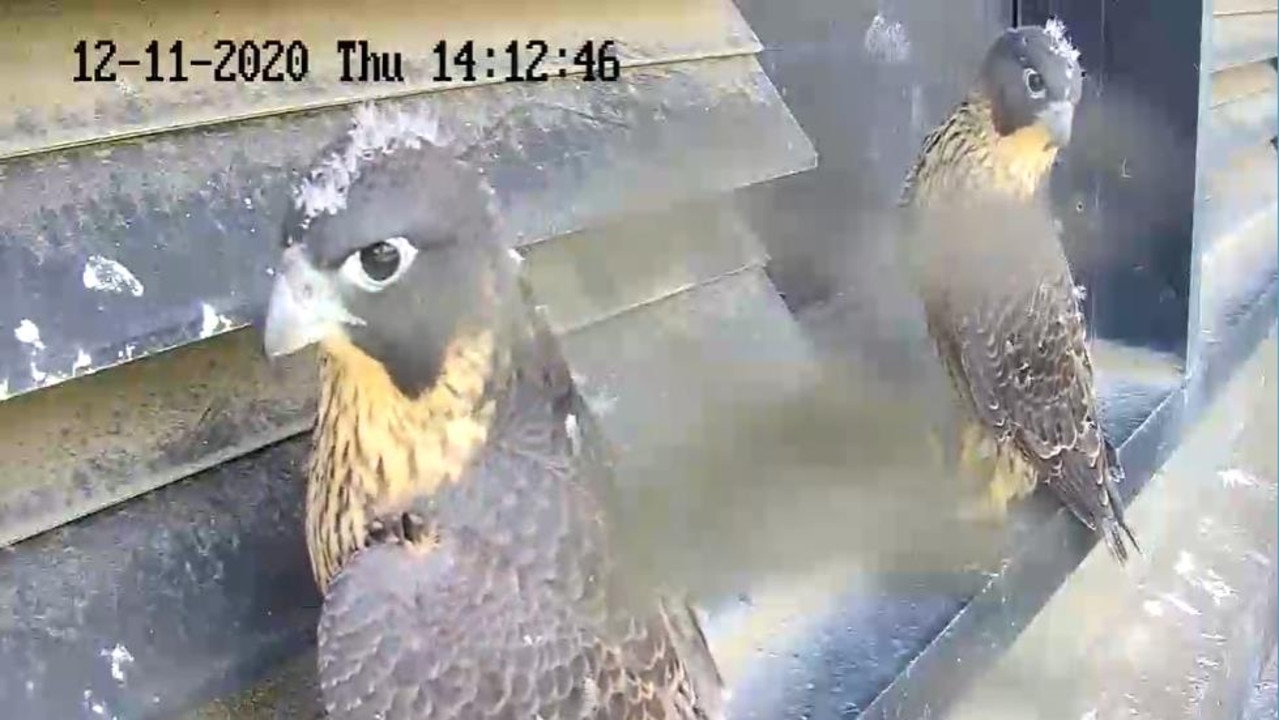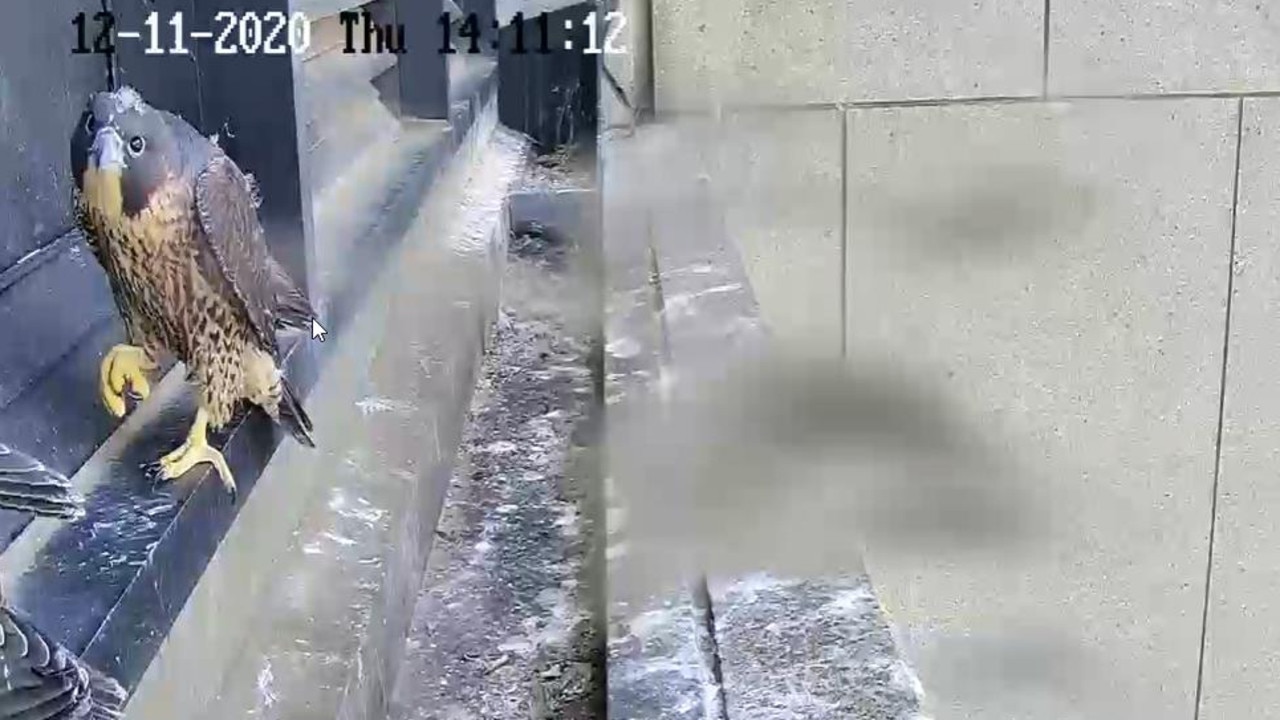Time to wave goodbye to the peregrine chicks
As Melburnians stretch their wings after the lockdown, the city’s famous peregrine falcon chicks are also stretching theirs, hopping and flying backwards and forwards along their home ledge

READING LEVEL: GREEN
As Melburnians stretch their wings* after one of the world’s longest coronavirus lockdowns, the city’s famous peregrine falcon chicks are also stretching theirs.
The three female chicks are spending their time half flying, half hopping backwards and forwards along the ledge their nest is on. Instead of fluff, they are now covered in feathers.
The chicks and their parents have been the stars of a live webcam watched by thousands of people around the world since the eggs were laid in a pebble-filled box on a ledge high above 367 Collins St on August 25, 27 and 29. Incubation* began on August 30 and they hatched on Friday, October 2. They will be six weeks old on Friday, November 13.
On July 8, Melbourne began its second lockdown to slow the spread of coronavirus, so the city streets below the falcons’ nest have been unusually quiet for the chicks’ entire lives.
When the chicks finally leave the nest for good, they will be soaring over city streets much busier than their parents have seen while out looking for food.
Falcons are predators, flying up to 300kmh to catch their prey, mainly other birds. Falcon fans have watched the chicks feast on baby birds of other species and even a pigeon in their first few days after they hatched. On Wednesday, one of the chicks was seen holding what looked like a green grass parrot or parakeet in its claws.

Victor Hurley, project leader of the Victorian Peregrine Project, said in August that at least six pairs of the species have taken up residency* on the ledge of the building at 367 Collins St over the years.
In the wild, some nesting sites are in use for hundreds of years by generations of the same family, so there is a possibility that one of these chicks will return to nest in this same spot in coming years.
WHAT TO EXPECT FOR THE CHICKS
BirdLife Australia’s Sean Dooley shares what typically happens from this point in a young peregrine falcon's life.
"From what we know, after the chicks make their first flights they may or may not come back to the actual nesting ledge again but they will stay with their parents for up to two months.
"The parents will teach them how to hunt and once a chick has made its first successful kill it won't be long before the parents drive it out of their territory. They are dedicated parents up until the time the chicks can fend for themselves. Then they get very grumpy at having the now full-sized birds in their territory!
"Generally, the female chicks will try and find their own territory up to 25km away from their nest. Male birds go further, up to 50km looking for a home. Many young birds can wander further than this as there is a lot of competition for peregrine territory.
"Peregrine falcons are great flyers but they will spend much more time sitting in trees resting or on the lookout of prey. They will sleep in tall trees too, or sometimes on cliffs or ledges of tall city buildings.
"The chicks grow very quickly and are basically full-sized by the time they leave the parents' territory to fend for themselves. However, life can be very hard for a young falcon and probably only about 10 per cent survive to breed and raise their own chicks. While they get their adult plumage* in their second year, it can take up to three years before they will attempt to nest.
"I must admit to having watched the nest cam more than I ever have this year. And I'm not alone as the number of people watching has really increased. For those of us stuck in lockdown, especially those of us here in Melbourne, watching the parents come and go as they fed their chicks was not only a fascinating story to watch happening in real-time, they represented a taste of freedom that we were all longing for!"
The live stream is at www.367collinsfalcons.com.au
GLOSSARY
- stretch their wings: do something different to normal or recent activity
- incubation: keeping eggs warm while the young animal inside develops
- residency: living in a place
- plumage: feathers
EXTRA READING
World waits for peregrine falcon eggs to hatch
All the action of the famous peregrine falcon family
How do birds fly? Why can’t humans fly?
QUICK QUIZ
- What species of bird are they?
- How many chicks are there?
- What sex are the chicks?
- When did they hatch?
- Why was the city quiet for the first few weeks of their life?
LISTEN TO THIS STORY
CLASSROOM ACTIVITIES
1. Make a Card
Design and create a special greeting card with a special message for the falcon chicks as they begin this new part of their lives.
Time: allow 25 minutes to complete this activity
Curriculum Links: English, Visual Communication Design
2. Extension
The city is very different since the chicks hatched. What tips would you give them to help them to survive and know the most important things they need to know?
Time: allow at least 20 minutes for this activity
Curriculum Links: English, Science
VCOP ACTIVITY
Opener Up-Level It
Make a list of all the openers in the article. Pick three that repeat and see if you can replace them with another word, or shuffle the order of the sentence to bring a new opener to the front.
Don’t forget to re-read the sentence to make sure it still makes sense, and that it actually sounds better.
HAVE YOUR SAY: What would you ask the falcon chicks if you could?
No one-word answers. Use full sentences to explain your thinking. No comments will be published until approved by editors.

